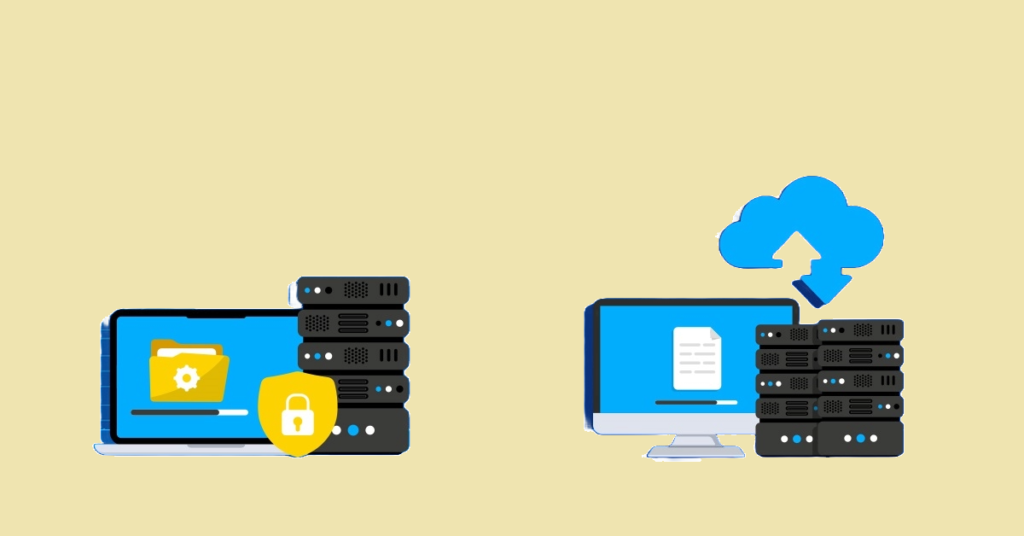In today’s digital age, safeguarding sensitive data has become more crucial than ever. With increasing dependence on online activities, it’s important to choose the right backup solution that meets your needs. Cloud and local backups are two popular methods of data protection, each offering unique advantages. This article breaks down the features, security, cost, and accessibility of both options to help you make an informed decision.
Exploring Cloud Backup
Cloud backup involves storing your data on remote servers managed by a third-party provider. These servers are often spread across multiple data centers, ensuring redundancy and reliability. Key features of cloud backup include:
- Easy Accessibility: Cloud backup allows data retrieval from anywhere with an internet connection. This is particularly beneficial for businesses with remote employees or individuals who travel frequently.
- Robust Security: Reputable cloud service providers implement advanced security measures, such as encryption, to protect your data both in transit and while at rest. They also comply with industry standards and regulations to ensure data integrity.
- Scalability: Cloud backup is highly adaptable, enabling users to scale their storage needs as required. Whether you’re backing up a small amount of data or several terabytes, cloud services offer flexible storage solutions.
- Cost Efficiency: While cloud backup services typically require a subscription, they are often cost-effective in the long run. These subscriptions include storage, security, and maintenance, which reduces the need for extensive in-house IT infrastructure.
Exploring Local Backup
Local backup involves storing data on physical devices such as external hard drives, USB drives, or network-attached storage (NAS). Below are the key characteristics of local backup:
- Full Control: With local backup, you have complete control over your data and backup processes. This eliminates reliance on third-party providers and offers customization options for data management.
- Speed: Local backups generally offer faster data transfer speeds compared to cloud backups, as they do not rely on internet bandwidth. This is particularly helpful for restoring or backing up large datasets quickly.
- Security: While local backups allow for physical control, security risks such as theft, fire, or hardware failure exist. To mitigate these risks, it’s important to use encryption and store the backup devices in a secure location.
- Upfront Cost: Local backup requires an initial investment in physical storage devices, but there are no ongoing subscription fees unless you need to expand your storage.
Cloud Backup vs. Local Backup: A Comparison
Data Security
Both cloud and local backup solutions offer security, but in different ways. Cloud services typically provide strong encryption and adhere to strict security protocols, making them reliable for data protection. However, no system is invulnerable to breaches or cyberattacks.
Local backup provides physical security but is vulnerable to risks like theft or damage from fire. It’s essential to implement additional security measures, such as encryption and secure storage.
Accessibility
Cloud backup excels in accessibility. You can retrieve your data from any device with an internet connection, which is invaluable for remote work or accessing files on the go. In contrast, local backup limits access to physical locations, unless you implement remote access solutions.
Cost
Cloud backup typically operates on a subscription model, which can increase as your storage needs grow. Local backup requires an upfront investment in hardware but comes with no recurring costs unless additional storage is required.
Hybrid Backup: Combining the Best of Both Worlds
A hybrid backup solution, which combines both cloud and local backup methods, provides an optimal balance of benefits. This approach ensures speed and control from local backups, while also offering scalability and remote access from cloud services. A hybrid solution enhances data security and redundancy, offering comprehensive protection from data loss.
Conclusion
The best choice between cloud and local backup depends on your specific needs. Cloud backup is ideal for those who prioritize scalability, remote access, and convenience. It is particularly useful for businesses and remote workers. On the other hand, local backup is better suited for users who want complete control over their data and faster data recovery speeds.
For optimal protection, many users opt for a hybrid approach that combines both methods. This ensures redundancy, flexibility, and security, reducing the risk of data loss.
Frequently Asked Questions (FAQs)
- What differentiates cloud backup from local backup? Cloud backup stores data remotely, while local backup uses physical storage devices like external hard drives.
- Which backup method offers more security: cloud or local? Both methods provide security in different ways. Cloud services typically offer stronger encryption and security standards, while local backup relies on physical security measures and encryption.
- How do the costs of cloud and local backup compare? Cloud backup involves subscription fees that can rise with data growth, while local backup requires an initial investment in hardware with no recurring costs.
- What are the advantages of cloud backup for businesses? Cloud backup is ideal for businesses because of its scalability, remote access, and disaster recovery options, ensuring business continuity.
- Does local backup provide faster data recovery than cloud backup? Yes, local backup generally offers faster recovery times, as data is stored on physical devices directly accessible.
- Should I use both cloud and local backups? A hybrid backup strategy combining both methods is recommended for optimal protection, providing redundancy and reducing the risk of data loss.
- How do cloud and local backups handle large files? Cloud backup can handle large files but may be slower due to bandwidth limitations. Local backups often offer faster speeds for very large files.
- Which backup method offers easier access? Cloud backups are accessible from anywhere with an internet connection, while local backups require physical access to the storage device.
- Are cloud backups reliable? Cloud backups are generally reliable, with most providers offering redundant systems and regular updates to ensure data integrity and availability.



